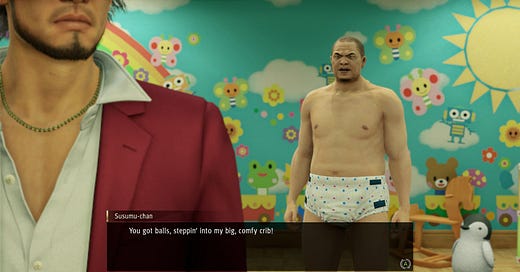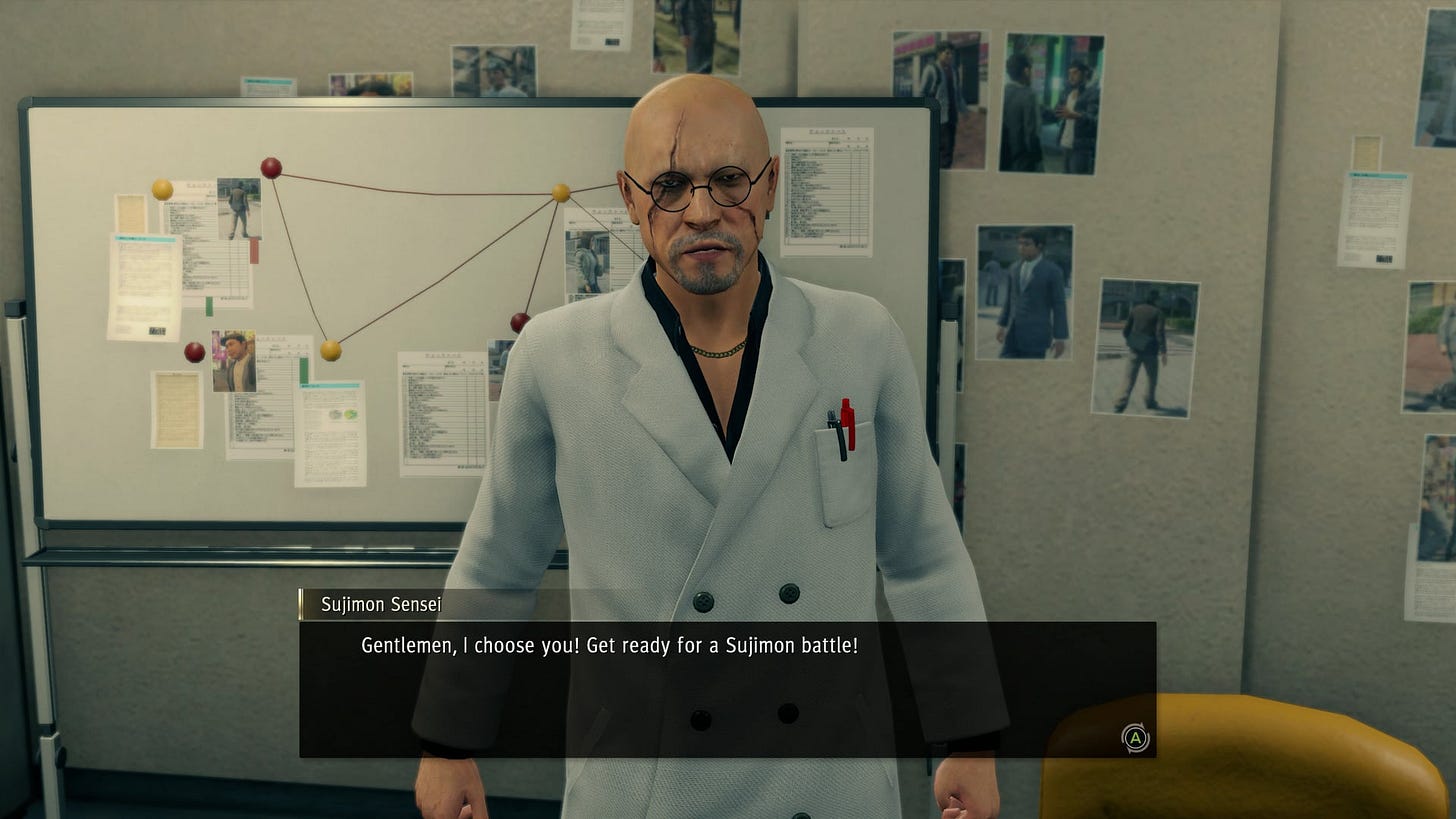Yakuza Like a Dragon Rocks
I recently had the chance to play Yakuza: Like a Dragon, a game that came out late last year. This game is the latest of a long-running series where players control a former member of the Yakuza and unravel a complicated crime drama plot including long cutscenes where tough Japanese guys confront their emotions and every once in a while tear off their suit jackets and shirt in a single motion to fistfight while showing off dope tattoos on their back. The Yakuza series is relatively niche, but it is generally well-received by fans because it has a mix of dramatic tones for the main plot while mixing in comedic and fun sidequests and minigames on a dense street-by-street replication of a neighborhood in Japan.
Like a Dragon is somewhat of a reboot: the main series has been going since 2005, and it has followed a single protagonist as he grew up from a baby gangster in the streets of a Tokyo red light district to becoming a legend known by all Yakuza. Those games mostly used an action brawler system for combat, where after an antagonist does something terrible you get to punch, kick, and suplex him using various complicated fighting moves, and sometimes weapons. Like a Dragon moves to a new main character and changes the setting from Tokyo to a red light district in Yokohama. And whereas the old gameplay was an action brawler, the new protagonist is a big Dragon Quest fan, so the battle system is a turn-based Japanese RPG experience.
So is it any good?
Yes. Yes it is.
Like a Dragon is interesting because it manages to retain the best aspects of the Yakuza series while expertly changing to RPG gameplay without a hitch. The same Yakuza experience of a dramatic plot are there, but so are the weird sidestories: you can watch low budget movies while trying not to fall asleep, playing a minigame where you hit buttons to stop humanoid sheep monsters from zapping you with sleep blasts. You'll help a man who lost his clothes while taking a bubble bath and needs you to guide him through a street of overzealous grandmas watering plants so his bubbles continue to cover his dignity. You might even befriend a crayfish named Nancy. And to make money, you can take over a failing confectionery company where you fight angry shareholders at board meetings by having your employees attack them. The Yakuza series is enjoyable because it combines so many seemingly disparate systems into a clever entertaining whole, and this game continues to do so.
But if you like turn-based RPGs, you’ll find a lot to like here. Instead of trying to punch a bunch of enemies before they punch you, you can direct your party members to attack or use special moves to eliminate your enemies, gaining experience and learning new moves when you gain levels. Each party member can be switch between various jobs, which unlock job-specific abilities when the characters’ job level increases. While many Japanese RPGs use a fantasy setting, the conceit of this game is that the setting is real-life modern Japan, but the protagonist looks at his fights like a Dragon Quest game. So instead of your “mage” character using magic to shoot a fireball, he chugs a bottle of alcohol and then uses a lighter to spit flames out. Instead of having a white mage, female party members can change to the “Idol” job and restore health by cheering on their friends. It’s like a non-shitty version of the modern-day Romeo and Juliet movie, subverting expectations while recreating common tropes and facets of the RPG genre. Plus there are some really fun easter eggs for Dragon Quest players that you will find as you play the game.
The game also takes some interesting inspiration from the Persona series. Like Persona, the main protagonist has “character attributes” like Style, Passion, Intelligence, etc., which can be increased and allow access to new sidequests or strengthen battle skills. And like Persona, the game does a very good job at building in downtime where the cast hangs out and seems like friends, through various conversations as you wander around town, conversations when you eat at restaurant to restore HP and MP, and a series of bonding events where you have side conversations with each party member as your friendship grows and they share more of their past and current troubles. By the end of the game, you feel like you’ve gotten to know each of your party members because the developers give them space to breath and interact like a real group of friends.
In another subversion of the genre, your party members aren’t all Japanese high school kids who somehow look like they are in the mid-20s (lookin’ at you every anime ever). Your first two party members are a disgraced cop who is a year away from retirement, and a homeless guy who used to be a nurse until he was fired for selling the hospital’s drugs on the side. Having older characters allows them to feel like a group of real people, rather than just another Japanese game/story about a group of high school kids who get drawn into a wild adventure.
Not everything is perfect: the Yakuza games have always done a good job at having male characters express emotion (yay), but they have also had a poor time giving space for memorable female characters beyond kidnappable McGuffins.
Like a Dragon isn’t as bad as some past games, but here is the list of jobs your male party members can have:
bodyguard
chef
break dancer
musician
host
construction worker
riot gear cop
fortuneteller.
Here are jobs for female party members:
hostess (attacks using purses)
dominatrix
pop idol
casino dealer.
It’s...not great. Aside from that, there are a few parts near the end where the game spikes the difficulty and expects you to spend a few hours grinding experience but doesn’t tell you before you get crushed.
But overall, it’s a very fun game. I put 50 hours into it before beating it, and there are still side quests I didn’t do and post-game dungeons I could enter to further strengthen my characters and get new gear. The writing of the main story is strong, with a plot that doesn’t rely on too many gimmicks and hits some strong emotional notes. You actually have moments of interaction and bonding with your party members, so you become attached to them as believable characters. And you’ll get to break up the serious story beats with fun side activities and missions, like the professor who gives you a “sujidex” to fill up by encountering all the enemies in the game, with periodic rewards for filling up your “sujidex,” including when you collect 151 entries. The writing is entertaining and you will constantly find new surprises around every corner of a surprisingly detailed Japanese neighborhood.
I had a good time with this game. You may too.1
It’s possible that I enjoy the Yakuza series so much because walking around a Japanese city and pretending to eat Japanese food at nice restaurants is the kind of virtual escapism I needed to get through months of COVID. There have been a number of evenings recently where I was playing a Yakuza game, went to a restaurant with nice pictures of real food, and had a 10 pm craving for fresh sushi.






